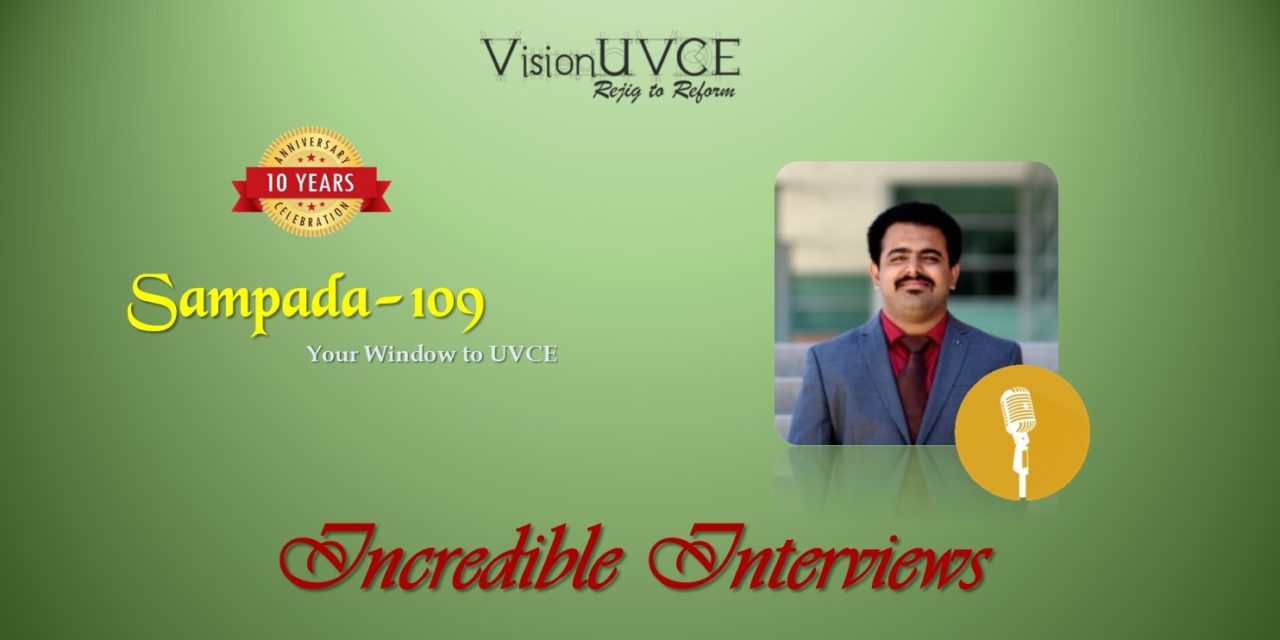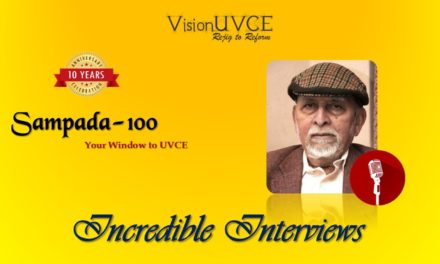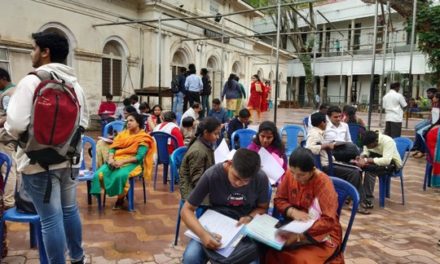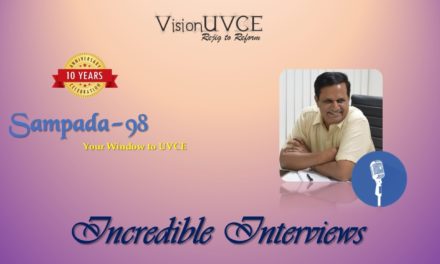Borrowed from SAMPADA old editions – for the 10th Anniversary Special Issue – Interviews section. This one is of Suraj Prasad, 2014 CSE.
Team Sampada: What inspired you to take Masters and especially the yearn to do it abroad?
Suraj: It was 2008, when I was part of the Advanced Space Academy at United States Space & Rocket Center in Huntsville Alabama. The training program was very educative and gained immense knowledge about Space Exploration. We were trained like real Astronauts and also built a team rocket to ensure the safety of the payload. The one week long training ended up with a graduation and got a chance to meet diverse people from other places of the world. I wanted to experience a similar yet a challenging experience. That was one of the main reason I wanted to come back to United States if at all I plan to pursue my Master’s.
After graduating from UVCE in 2014, I joined American International Group (AIG) as a Business Intelligence Developer and started working on tools such as Qlikview, Tableau etc. After one year at AIG, the learning curve took a hit, there were talks of a severe layoff in the company and I did not have the enough skills to get a job elsewhere. As per the famous saying – “Blessing in disguise” I decided this is the right time to pursue my Master’s. I knew the location where I would pursue Master’s. But the big question was which course? Computer Science? Business Analytics? Or a complete different course-MBA? When confusion was at peak, I started doing my own research to find out which course is best for me, what are the best universities that offer courses which would suit my interests. I started asking my friends who were in the U.S who were pursuing or had already pursued Master’s in the U.S.
After pondering about my choices, I decided to go ahead to pursue M.S in Management Information Systems as it was an amalgamation of Technical and Managerial courses. I got to know about the required things to apply for a University in the US from my friends. I also joined discussions with like-minded people in “MS in US” Facebook and WhatsApp groups. Studying for GRE & TOEFL examinations on my own, preparing the Statement of Purpose, Asking my professors in UVCE for Letter of Recommendations, Applying for Transcripts in the Jnana Bharathi Campus, Rewriting my GRE exam to get a better score, Shortlisting the universities to classify them into safe, moderate, ambitious, very ambitious categories, hitting the submit button on the application link and also working fulltime during the Master’s Application process took me almost 8 months. I applied for 5 universities and got admits in all of them. The waiting period for results was 2 weeks to 2 months for the Universities I had applied. In March I made up my decision to go ahead with the University of Arizona as the MIS program is ranked #3 in the country. In the month of June, I had my F1-VISA interview in Chennai, got my stamping and in August 2016 I was in the US to pursue my American dream for the second time.
Team Sampada: What inspired you to take Masters and especially the yearn to do it abroad?
Suraj: My experience has been a bittersweet one in the US. I gained knowledge in Business Intelligence domain and had fun during my Masters. I also got an assistantship for two semesters and learnt a lot during my work on the campus. However after graduation was a journey to forget. I took almost 6 months to get a decent job and the variety of rejections I have received is something to talk about. After facing a layoff in the company I was working before and experiencing another phase of Unemployment is close to a nightmare for sure. Things turned around and then got a job in the Phoenix area. Believing in yourself and not losing hope are the two mantras I followed. Having studied in India throughout my life, pursuing my masters in the US was a herculean task for sure both financially and emotionally. I stepped out of the house and started living in a different city for the first time. I had to fight homesickness during my initial days of my stay here.
I took almost a month to settle down and understand how to study and ace the grades in the US system of Education. There was a cultural shock as the cohort consisted of people from different parts of India and other parts of the word. Unlike India, Weightage was given not just to the semester end examinations but also the regular assignments and projects which had to be submitted before the deadline. In some courses, we were given a case study and had come up with an appropriate problem statement and its best possible solution. The team with the best solution would walk away with the bragging rights. At the end of the semester, there were project presentations where we would showcase our project results to the entire class. Teamwork and Time management is the key. Completing assignments on time, having regular meetings with project team, brainstorming innovative ways to solve a problem statement, applying online for jobs, reaching out to seniors for referrals and guiding the new incoming students were some of the day-to-day activities during my Masters. Along with this, I also worked 20 hours every week as a Data Engineer at the University Analytics Center. Going to class in the morning, heading to the office, going back to my evening class and doing the coursework in the evening was my typical day. Prioritizing the activities for the day was something I learnt almost every day.
Team Sampada: From your experience or learnings, what according to you is the key factors that one should work (eg., academics, financial position, personality development, skillset or anything) whilst planning for masters abroad?
Suraj: These factors are different for different people. Below are some of the factors I considered to pursue my Master’s in the U.S. :
1. Academics : Many Universities offer the same program with the same name (say Computer Science), But not all the universities will have the same coursework. It is required to go through the coursework of each and every university and then select what suits best for you according to your interest. It is also important to understand the pre-requisites, mandatory courses and electives offered by the University.
2. Financial position : Another important thing to consider is the tuition fees for the university. The fees will be quite expensive for Private universities and it is relatively less for State Universities or Public Universities. It is advised to talk to the Alumni or currently enrolled students to know about the University fees, Student Worker opportunities (On-Campus), Transportation and most importantly the cost of living in the city where the University is located. Enough research should be done if the University offers any kind of Graduate or Teaching Assistantships (Some universities also offer Fee reduction as well).
3. Technical & Personal Development skills : Before coming to US for Masters, I had worked for two years as a Business Intelligence Developer and had acquired enough technical skillset throughout my work experience. I was looking forward to upgrade both my technical and non-technical skills in the Master’s program. There is a myth that if you study anywhere in the bay area you will get a good job. There have been cases where in spite of studying in such locations, people have struggled to get any job. However, studying regularly during the coursework, completing the assignments on time and learning latest technologies in your field of study will enrich your technical skills to a large extent. Every course you enroll in the University will have a project which you will be working on throughout the course. Try to make teams with diverse people & lead the project if needed which will help your communication and leadership skills. These good practices will upgrade your skills & make your Masters experience the best.
4. Job Opportunities : If you have considered the above factors seriously, you are on the right track. Attending Networking events, Career Fairs, Conferences, Referrals and applying online are some of the ways people get jobs (Internships/Full time employment). Have a good rapport with your seniors and ask for their guidance regarding the courses as well as Job Opportunities. Try to get an internship during the summer break which will add value to your resume and you never know you might end up getting a FTE offer there.
– Suraj Prasad, Sampada-109





